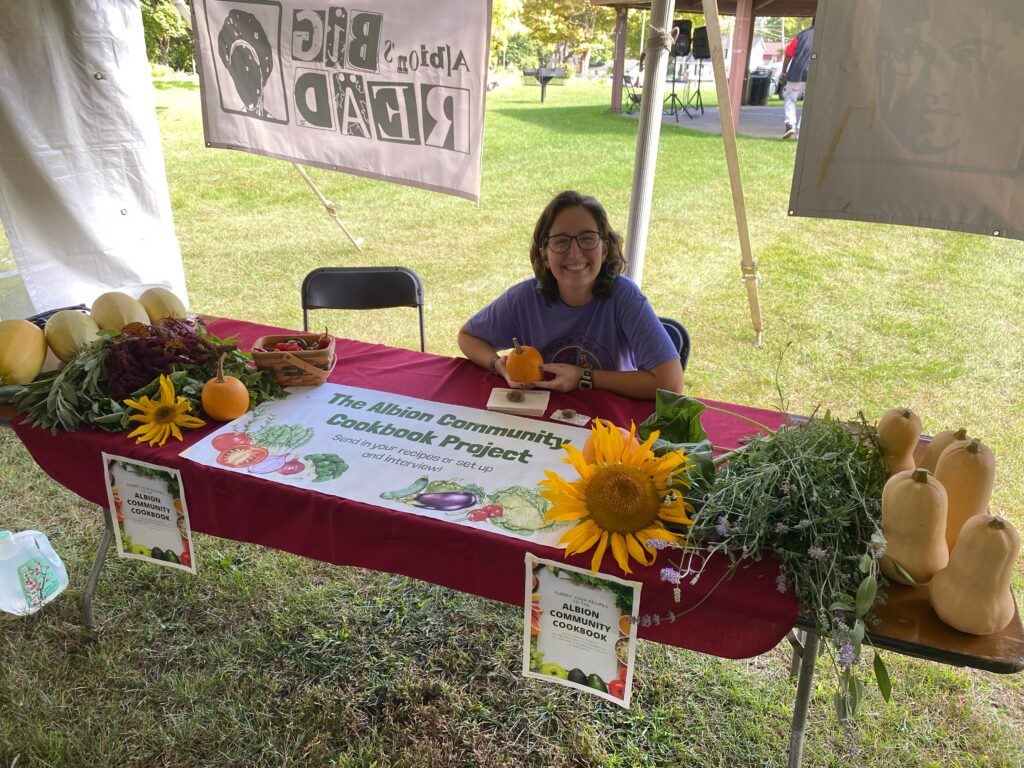Collecting Albion’s recipes, embracing its long-ignored voices
Related Posts
Connect With Us
August 16, 2024
A fourth-generation gardener from Blissfield, Michigan, the field-to-garden-to-table pipeline is nothing new to Ashlynn Reed ’24.
She’s long known that the best meals usually start in fields and gardens or at farmer’s markets, not the supermarket. Her family grew fruits and vegetables ranging from zucchini and tomatoes to pumpkins and strawberries.
“We have a lot of family recipes, one of them being our zucchini bread,” Reed said. “And it was a staple during breakfast. My brother and I would always have it right before school.”
“I grew up cooking a lot, but I also worked in food service all throughout high school,” she continued. “Didn’t really like it, but I did like cooking. I came to Albion with a family history of gardening.”
So it was somewhat of a no-brainer when, at the urging and encouragement of Trisha Franzen, master gardener at the Albion Community Garden (ACG), Reed decided to create an Albion cookbook. At the time, she was working at ACG as an intern through Albion AmeriCorps and Albion College Center for Sustainability and the Environment, where she’s now employed as sustainability coordinator.
The two-year project, which culminated with the publishing of The Albion Community Cookbook (Cookbook Publishers) would prove more challenging than expected. Along the way, Reed learned that collecting prized recipes is one thing; gaining the trust (and recipes) of voices traditionally ignored throughout Albion’s (and the country’s) history is another. Much of that Albion history and present-day legacy is documented in her senior thesis, which won Outstanding Senior Honors Thesis.
“[Ashlynn] understood the importance of belonging in a community,” said Thom Wilch, professor of earth and environment. “She understood that belonging requires real relationships with people. She had to work hard to gain people’s trust.”
From internship to published author
Reed’s work through ACG and in partnership with the Albion Healthcare Alliance and the Albion Community Table had been eye-opening before she’d compiled a single recipe.
“Albion is a food apartheid. The situation in Albion is definitely race-motivated and systematically motivated,” she said. “There’s not a ton of fresh produce in Albion. And [when] there is, it’s not affordable and it’s not great quality.”
That became evident during the various food-distribution efforts in which Reed participated.
“The ACG distributes food–through the senior center and we also have a stand outside the main garden location,” Reed said. “Tuesday distribution at the Albion Community Table usually has a long line of community members…although there is almost never any fresh produce for those distributions.”
Yet another issue was that some recipients had no idea what to do with some of the food items.
“A lot of times what we find at the garden is that you give somebody an eggplant or you give somebody some squash or something, they don’t always know what to do with that,” Reed said.

Albion College graduate Ashlynn Reed ’24.
Gaining trust and recipes
Reed started the cookbook project by examining the dozens of cookbooks at the Albion District Library, some of which date back to the 1890s. Despite the demographic diversity which had been present in Albion at least since the 1920s, there was virtually no representation of those populations, giving the false impression that those groups hadn’t existed or made any culinary contributions.
“There were only two cookbooks that had ‘ethnic’ sections, but they were really vague,” Reed noted. “[The cookbooks] really didn’t portray the importance of diversity in Albion.”
For example, despite Albion’s long presence of African Americans, many of whom were part of the Great Migration from the South, there were no recipes involving southern staples such as collard greens or okra. Native American recipes were also sparse. Suddenly, the project became more complicated than Reed originally thought it would be–getting recipes and stories from groups which had historically been ignored.
“I decided my main focus would be representing Albion’s ethnic diversity, but also giving people a platform to stand on and tell their stories,” Reed said.
Reed’s outreach to the community included posters, Facebook and Instragam posts, flyers to churches, and handing out business cards at community events. Her research was aided by funding from Albion College’s Foundation for Undergraduate Research, Scholarship and Creative Activity.
“I learned a lot as an outsider but in the end I became an insider,” Reed said. “I really feel like I’m a part of this community now. But it was tough and sometimes frustrating. There is, historically, a bit of a lack of trust between the college and some members of the community.”
She was able to break through some of those layers of mistrust. The result of Reed’s efforts is a cookbook replete with recipes for soups, vegetables, side dishes, main dishes, desserts and breads, snacks, sauces, and seasonings all working to represent Albion’s diverse history.
There is an entry from a churchgoer who submitted a cake recipe from a dear, departed friend; a traditional wild rice recipe from a tribal member of the Gun Lake Potawatomi.
“I met with him and we talked about the Wild Rice Initiative on the Kalamazoo River and in the Whitehouse Nature Center, and he gave me some recipes,” Reed said. “That was fascinating. It was awesome.”
“[This project] was very enlightening,” Reed said. “I’m really proud of my work, and I’m really thankful to everyone who shared recipes and their stories.”